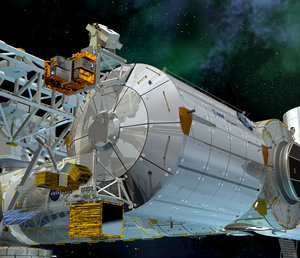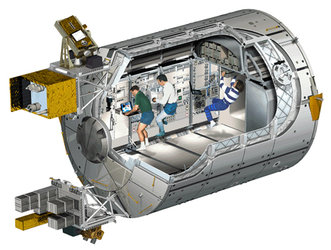ESA Columbus Essay Contest winner - Philippa Molyneux
The value of human spaceflight for European citizens
In 1957, scientists from the Soviet Union successfully launched the world's first artificial satellite, signalling the start of a highly competitive 'space race’ between the Soviets and their counterparts in the United States. Over the following decades, both countries fought to prove their scientific and military expertise by establishing a human presence in space. This fierce rivalry fostered a huge public interest in human spaceflight, as people all over the world were inspired by images of cosmonauts and astronauts orbiting the Earth and eventually standing on the moon. But this enthusiasm did not last. Humans have not set foot on the moon since 1972, and while the International Space Station now provides a base for different nations to experiment in space, the manned missions to explore other bodies in our solar system that many thought inevitable after the success of the Apollo programme have not been realised.
Fifty years after the launch of Sputnik kicked off the space age, the idea of human space exploration is beginning to gain popularity again. More countries now have the technology and resources to contribute to this next step in spaceflight history. China has recently become the third nation to launch an astronaut into orbit, while Europe will be increasing its presence on the ISS with the launch of the ESA Columbus laboratory this December. President Bush has announced a goal of returning humans to the moon by 2020, and ESA’s Aurora exploration programme will lead to a manned mission to Mars around 2030. This ambitious project will require collaboration with space agencies from around the world, but what can European citizens expect to gain from the work?
The European economy is strong, but since the industrial revolution it has been centred largely on manufacturing goods for trade and export. These days it is cheaper to produce many items outside of the European Union, and as a result Europe’s economic growth has slowed. If the economy of the European Union is to stay strong, it must move away from the old industrial economy, and towards a new ‘knowledge-based economy’ in which scientific and technical expertise are more valuable than industry. In March 2000, the European Council set out a development plan to this effect: the Lisbon Strategy. Its aim is to make Europe "the most competitive and dynamic knowledge-based economy in the world" by 2010, driving economic growth and reducing unemployment. Developments in human spaceflight would undoubtedly contribute hugely to this aim.
It may be argued that robotic space missions could fuel the new economy as successfully as manned missions, without the risks inherent to human exploration and at lower cost. However, the benefits of manned operations should not be underestimated. One of the main problems Europe faces in establishing a knowledge economy is that fewer people are choosing to study science and technology subjects to degree level- a trend that must be reversed to provide the well-educated and skilled workers necessary for such an economy to succeed. Human spaceflight may be one way to inspire more children to study science, both directly, through meeting astronauts and hearing about their work, and indirectly, through films and books inspired by the possibilities of space exploration.
While astronauts of all nationalities have the ability to encourage and motivate students, European children will relate more easily to European astronauts and so these would arguably have a bigger influence on the pupils' opinions of science.
The scientific rewards of manned missions may also exceed those of unmanned missions. Robots lack the flexibility and problem-solving abilities of humans. A human in space may notice something interesting that robots would not know to look for, potentially altering the course of the mission, or saving a mission that might otherwise be unsuccessful. Humans are also able to cover much more ground in a given time: the inability of robot rovers to independently determine the best path to take means they must frequently send data about their position to Earth for analysis or spend long periods of time observing their surroundings in order to decide which way to go. The difference in efficiency between human and robot explorers can be quantified by comparing two missions: the Apollo 17 moon landing and the Mars Exploration Rover mission. In one day, the Apollo 17 astronauts covered 35 km and collected 110 kg of moon rock* while after two years on Mars, the Spirit and Opportunity rovers** had each covered just over 6 km.
Human spaceflight would clearly bring advances to planetary and space sciences, as well as in engineering and computing, as suitable space vehicles and communications systems would have to be designed or adapted for each mission. However, many of these advancements might well be made whether men or robots were sent to explore, albeit on different timescales. The main area of research in which manned missions would be significantly more useful than unmanned missions is biology. A human spaceflight programme would provide a unique opportunity to study the reaction of the human body to extreme conditions-specifically microgravity and high radiation levels- in space, potentially providing valuable insights into the workings of the body’s organs and systems that could affect the way in which certain diseases are treated on Earth. For example, NASA works closely with America’s National Institute of Health (NIH) to study the similarities between changes experienced by a human body in space and the aging process, increasing our understanding of the problems people might face as they grow older.
The scope for progress in such a broad range of disciplines is one of the strongest arguments for human spaceflight in Europe. At a time when the European economy is changing to support more innovation in scientific and technological research, the potential of human spaceflight to advance science and inspire future researchers makes it a unique and exciting area of development. As more nations around the world start to develop the capability for space exploration, it is vital for Europe to maintain its position as a strong contributor to this field.
* http://library.thinkquest.org/29033/voyages/apollo.htm
** http://mer3d.free.fr/





